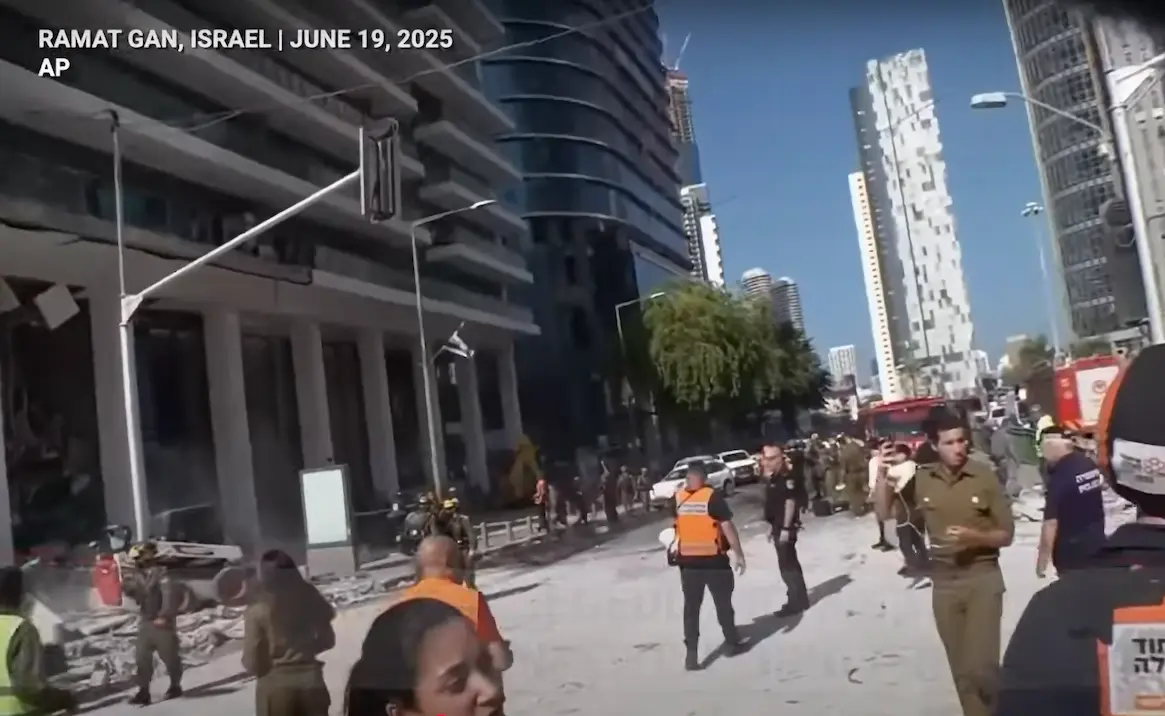
Chaos erupted across Israel on June 18 as Iran launched a massive missile assault
Flames and Fear in the Night: Cities Reeling from Relentless Strikes
Flames and Fear – Shortly after nightfall on June 18, air raid sirens pierced the calm in Tel Aviv, Haifa, Be’er Sheva, and Ashdod. Within minutes, the skies were alight with fire as Iran’s Revolutionary Guard Corps launched over 30 ballistic missiles and drones the most aggressive strike yet in the ongoing conflict.
The Tel Aviv Stock Exchange, neighborhoods in Ramat Gan, and an IDF logistics hub in Be’er Sheva were among the primary targets. Emergency responders confirmed at least five deaths and more than 70 injuries, with hospitals scrambling to treat the wounded. In one devastating hit, a residential tower near the Exchange crumbled from a direct strike, sending shockwaves through the financial district.
Israel’s famed Iron Dome and David’s Sling defense systems were active but saturated. Witnesses described multiple interceptors firing but several missiles still found their mark.
Why the Strike Succeeded: Tehran’s Tactical Shift
The Iranian strike, labeled Operation True Promise 3, was a deliberate and strategic escalation. Military analysts believe Tehran saturated Israeli defenses using a mixed payload of high-speed drones, hypersonic missiles, and decoys, overwhelming radar systems and exploiting known gaps.
While Israel’s interceptors performed admirably under pressure, several missiles penetrated to reach high-value targets, creating scenes of fire, panic, and blackouts across parts of Tel Aviv.
“This wasn’t indiscriminate, it was coordinated,” noted defense analyst Noa Regev. “Iran went after symbolic and strategic sites: economic institutions, intelligence centers, and civilian morale.”
In an emergency address, Prime Minister Benjamin Netanyahu called the barrage “a declaration of war” and vowed a punishing response: “We will hold those responsible accountable in Tehran and beyond. No threat to Israel will go unanswered.”
Global Alarm and Human Toll Mount
The impact of the strike reverberated beyond Israel’s borders. Oil prices surged past $100 a barrel. International flights were grounded across the region. The UN Security Council scheduled an emergency meeting, and humanitarian groups warned of an impending crisis as thousands sought shelter.
Civilians bore the brunt of the chaos. Hospitals overflowed with injuries from broken glass and fire-related trauma. Parents shielded children in underground shelters. Still, amid the fear, stories of courage emerged: medics ran into burning buildings, and volunteers helped evacuate the elderly and disabled.
The United States, the EU, and India condemned the Iranian attack while urging both sides to pull back from the brink. But with Israel already preparing a retaliatory strike package and Iran promising further “responses to aggression,” the outlook remains perilously uncertain.
Stay updated with the latest news on Rapido Updates. Keep yourself updated with The World, India News, Entertainment, Market, Gadgets, Sports, and many more..
2 thoughts on “Flames and Fear- Iran’s Brutal Missile Barrage Engulfs Israel”